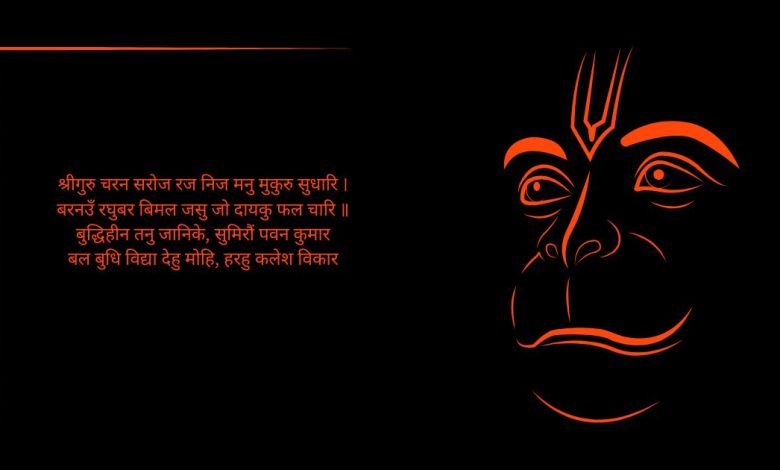
The Hanuman Chalisa in Hindi: A Devotional Hymn of Strength and Devotion
The Hanuman Chalisa: A Devotional Hymn of Strength and Devotion
The Hanuman Chalisa is one of the most revered and widely recited devotional hymns in Hinduism, dedicated to Lord Hanuman, the mighty monkey-god known for his unwavering devotion, immense strength, and boundless wisdom. Composed by the 16th-century saint and poet Goswami Tulsidas in the Awadhi language, this 40-verse hymn (chalisa means forty) holds a special place in the hearts of millions of devotees across the world.
🕉️ हनुमान चालीसा
(Hanuman Chalisa – by Goswami Tulsidas)
॥ दोहा ॥
श्रीगुरु चरन सरोज रज, निज मन मुकुर सुधारि।
बरनऊँ रघुबर बिमल जसु, जो दायक फल चारि॥
बुद्धिहीन तनु जानिके, सुमिरौं पवन-कुमार।
बल बुद्धि विद्या देहु मोहि, हरहु कलेस विकार॥
॥ चौपाई ॥
- जय हनुमान ज्ञान गुण सागर।
जय कपीस तिहुँ लोक उजागर॥ - रामदूत अतुलित बल धामा।
अंजनि-पुत्र पवनसुत नामा॥ - महावीर विक्रम बजरंगी।
कुमति निवार सुमति के संगी॥ - कंचन बरन बिराज सुबेसा।
कानन कुंडल कुंचित केसा॥ - हाथ वज्र औ ध्वजा बिराजै।
काँधे मूँज जनेऊ साजै॥ - संकर सुवन केसरी नंदन।
तेज प्रताप महा जग वंदन॥ - विद्यावान गुनी अति चातुर।
राम काज करिबे को आतुर॥ - प्रभु चरित्र सुनिबे को रसिया।
राम लखन सीता मन बसिया॥ - सूक्ष्म रूप धरि सियहिं दिखावा।
विकट रूप धरि लंक जरावा॥ - भीम रूप धरि असुर सँहारे।
रामचन्द्र के काज सँवारे॥ - लाय संजीवन लखन जियाए।
श्री रघुबीर हरषि उर लाए॥ - रघुपति कीन्ही बहुत बड़ाई।
तुम मम प्रिय भरतहि सम भाई॥ - सहस बदन तुम्हरो जस गावैं।
अस कहि श्रीपति कंठ लगावैं॥ - सनकादिक ब्रह्मादि मुनीसा।
नारद सारद सहित अहीसा॥ - जम कुबेर दिगपाल जहाँ ते।
कबि कोबिद कहि सके कहाँ ते॥ - तुम उपकार सुग्रीवहिं कीन्हा।
राम मिलाय राज पद दीन्हा॥ - तुम्हरो मन्त्र विभीषण माना।
लंकेश्वर भए सब जग जाना॥ - जुग सहस्र जोजन पर भानू।
लील्यो ताहि मधुर फल जानू॥ - प्रभु मुद्रिका मेलि मुख माहीं।
जलधि लाँघि गये अचरज नाहीं॥ - दुर्गम काज जगत के जेते।
सुगम अनुग्रह तुम्हरे तेते॥ - राम दुआरे तुम रखवारे।
होत न आज्ञा बिनु पैसारे॥ - सब सुख लहै तुम्हारी सरना।
तुम रक्षक काहू को डरना॥ - आपन तेज सम्हारो आपै।
तीनों लोक हाँक तें काँपै॥ - भूत पिशाच निकट नहिं आवै।
महाबीर जब नाम सुनावै॥ - नासै रोग हरै सब पीरा।
जपत निरंतर हनुमत बीरा॥ - संकट से हनुमान छुड़ावै।
मन क्रम बचन ध्यान जो लावै॥ - सब पर राम तपस्वी राजा।
तिनके काज सकल तुम साजा॥ - और मनोरथ जो कोई लावै।
सोइ अमित जीवन फल पावै॥ - चारों जुग परताप तुम्हारा।
है परसिद्ध जगत उजियारा॥ - साधु-संत के तुम रखवारे।
असुर निकंदन राम दुलारे॥ - अष्टसिद्धि नव निधि के दाता।
अस बर दीन जानकी माता॥ - राम रसायन तुम्हरे पासा।
सदा रहो रघुपति के दासा॥ - तुम्हरे भजन राम को पावै।
जनम-जनम के दुख बिसरावै॥ - अंत काल रघुबर पुर जाई।
जहाँ जन्म हरि-भक्त कहाई॥ - और देवता चित्त न धरई।
हनुमत सेइ सर्ब सुख करई॥ - संकट कटै मिटै सब पीरा।
जो सुमिरै हनुमत बलबीरा॥ - जय जय जय हनुमान गोसाईं।
कृपा करहु गुरु देव की नाईं॥ - जो शत बार पाठ कर कोई।
छूटहि बंदि महा सुख होई॥ - जो यह पढ़ै हनुमान चालीसा।
होय सिद्धि साखी गौरीसा॥ - तुलसीदास सदा हरि चेरा।
कीजै नाथ हृदय महँ डेरा॥
॥ दोहा ॥
पवन तनय संकट हरन, मंगल मूरति रूप।
राम लखन सीता सहित, हृदय बसहु सुर भूप॥
Origins and Composition
Tulsidas, who is also the author of the Ramcharitmanas—a retelling of the Sanskrit epic Ramayana in vernacular Hindi—wrote the Hanuman Chalisa as an expression of his deep devotion to Lord Hanuman. According to legend, Tulsidas composed the hymn while imprisoned by Mughal Emperor Aurangzeb, and through the grace of Hanuman, he was miraculously released.
The Chalisa is written in a lyrical and rhythmic form that is easy to memorize and chant. It begins with an invocation and praises Hanuman’s virtues, strength, knowledge, humility, and his devoted service to Lord Rama. Each of the forty verses highlights a unique aspect of Hanuman’s divine nature and his heroic deeds as described in the Ramayana.
Structure and Meaning
The Hanuman Chalisa opens with a couplet invoking the blessings of Lord Hanuman for strength, wisdom, and the removal of sorrow:
“Shree Guru Charan Saroj Raj, Nij mane mukure sudhaari
Barnaun Raghubar Bimal Jasu, Jo dayaku phal chari”
This sets the tone for the verses that follow, each of which is a vivid portrayal of Hanuman’s personality—his speed, agility, courage, loyalty, and humility. Notably, the Chalisa does more than just praise; it also serves as a spiritual guide and a source of inner strength.
Spiritual and Psychological Impact
Devotees recite the Hanuman Chalisa for various reasons—protection from evil forces, strength in times of hardship, and mental peace. Many believe that regular recitation brings relief from fear, anxiety, and negative influences. The rhythmic chanting is said to create vibrations that help calm the mind and elevate the soul.
Psychologically, the Chalisa instills a sense of courage and resilience. The image of Hanuman lifting mountains, burning Lanka, and leaping across the ocean inspires devotees to overcome personal and spiritual challenges. In a modern context, this hymn offers not just spiritual solace but also motivational strength.
Cultural Significance
The Hanuman Chalisa transcends regional and linguistic boundaries. It is recited in temples, homes, and even in public gatherings, especially on Tuesdays and Saturdays, which are considered auspicious for Hanuman worship. Festivals like Hanuman Jayanti witness mass recitations of the Chalisa, drawing large crowds and creating a collective devotional atmosphere.
Beyond India, the hymn has found a global audience, with translations and musical renditions in several languages. It is frequently set to music by renowned artists and used in yoga and meditation sessions for its calming effects.
Conclusion
The Hanuman Chalisa is not just a religious chant but a timeless ode to faith, strength, and devotion. It connects the devotee to the divine, inspires courage in the face of adversity, and reinforces the values of humility, service, and unwavering dedication. In a world often fraught with uncertainty, the words of the Chalisa continue to resonate with profound spiritual and emotional power.










